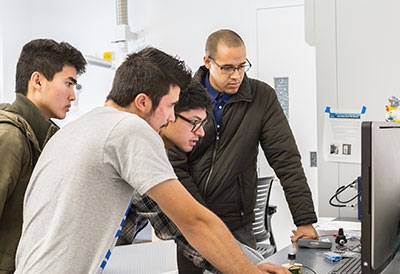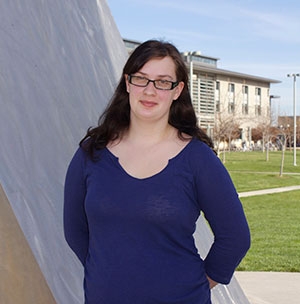Internship Program Enhances Students’ Academic Experiences
Last fall, the Division of Student Affairs and the Office Undergraduate Education launched an internship program with the goal of providing undergraduate students an opportunity to build experience and skills related to their career ambitions and to integrate them with their academic learning.
Diana Chavez, assistant director of professional development programs for the Center for Career and Professional Advancement, believes the newly created Student Success Internship (SSI) Program is filling a void.

“While many students find internships off campus, others are seeking on-campus internship opportunities that are different than student employment,” Chavez said. “Internship experience is key to their professional development and helpful in developing their career trajectories.”
The program was created to be project-driven and mutually beneficial to the students and the groups that are mentoring them.
In September, the call went out across campus for mentor-supervisors — staff and faculty members — to propose an internship, commit to regular meetings with the interns, and design and assess the learning outcomes of the students’ work.
Although the timeline was short, about 40 proposals were submitted by staff and faculty members, and 32 interns were selected to work across campus in positions centered in research, critical thinking and project management.
Work Benefits Research Projects, Campus Operations
Derek Brigham, Jonny Nguyen and Marek Abarca are working in Professor Abel Chuang’s engineering lab. The trio is working with researcher and UC Merced alumnus Felipe Mojica to develop a solar-powered regenerative fuel cell charging system. The charging system integrates four key components of advanced technologies, including solar cells, water electrolyzers, hydrogen storage and fuel cells to power devices 24 hours a day.
For Brigham, the internship has helped put the theories he’s learned in the classroom into practice.
“It's been very helpful to my learning to see how fuel cells, electrolyzers and solar panels work, and design a system that integrates all three,” said Brigham, a mechanical engineering major who will graduate in December and pursue a doctorate in Chuang’s lab. “It has motivated me to work harder, because I see that there are a lot of benefits and opportunities in renewable energy.”
In addition to providing the campus community with outdoor charging capabilities, the system will produce zero emissions, which is in line with UC Merced’s sustainability goals. The team displayed the charging unit at Bobcat Day on April 16 to inspire others to consider renewable energy opportunities.
While some students are using their internships to gain professional experience to advance toward their careers, others are improving their competitiveness for applying to graduate programs.
For her internship, Savanna “Gracie” Briggs took on the task of assisting the Campus Working Group on Assessment with launching a new surveying process in hopes of maximizing survey-response rates and making results more meaningful and actionable. The new survey coordination process will help the campus community manage surveying to everyone’s benefit.
Briggs, a psychology major who is set to graduate in May, believes the internship has been an invaluable learning experience for her future plans of teaching psychology at the college level and conducting research.
Internship Leads to Better Training Practices
 Biological sciences and psychology major Genevieve Mullins has spent the past four months developing two training courses to help graduate students use equipment in the Stem Cell Instrumentation Foundry (SCIF). While training is mandatory and already provided for researchers and students who use the SCIF, project scientist David Gravano applied for the SSI internship funding to provide more detailed instruction.
Biological sciences and psychology major Genevieve Mullins has spent the past four months developing two training courses to help graduate students use equipment in the Stem Cell Instrumentation Foundry (SCIF). While training is mandatory and already provided for researchers and students who use the SCIF, project scientist David Gravano applied for the SSI internship funding to provide more detailed instruction.
Mullins taught two day-long courses during spring recess last month. A course on flow cytometry will improve training on use of the flow machines, and help students with sample prep and data analysis which, in turn, improves the results yielded from tests. A course on cell sorting is designed to enable graduate students to independently use cell sorters.
“Designing and teaching these courses is preparing me for graduate school by providing me useful tools that I will use frequently in my graduate research,” Mullins said. “It will also improve my public speaking and teaching abilities, which will be very useful when I become a T.A. and a professor.”
Student interns work on their projects 10 to 18 hours per week and can earn up to $4,000, which is paid by the UC Office of the President.
A research symposium was held April 27 to allow interns an opportunity to showcase their work to the campus community.
Due to its success, the Student Success Internship Program will continue for the 2016-2017 academic year. Applications will be available this summer. For information, email dchavez22@ucmerced.edu.
